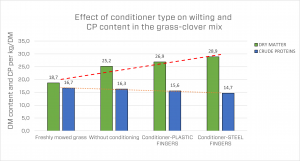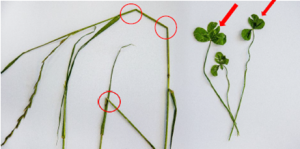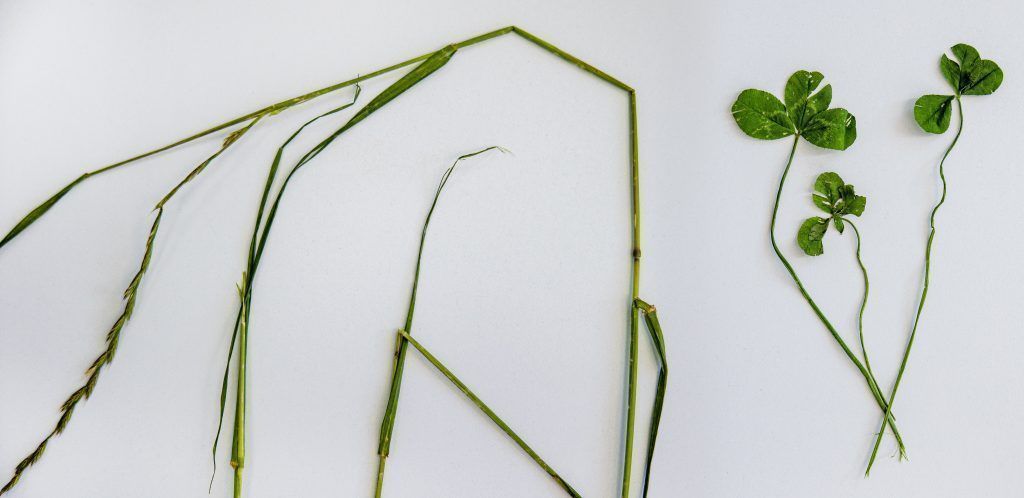Mowing with a conditioner enables faster wilting or drying of the forage. Fast wilting is very important for the shorter time that forage lays on the field by which nutrients are preserved and forage quality is better. There are two types of finger conditioner, namely plastic and steel fingers (or steel tines). A finger conditioner with rigidly mounted plastic fingers (FPC) scrapes and damages the epidermis on stems and leaves and breaks stems. Flexible steel fingers (FSC) are slightly more aggressive during conditioning, as they damage, break, and «scratch» the stems, thus enabling even faster loss of moisture. Since these two conditioner types damage the plants differently, the decision to choose the right type of conditioner on the mower must be based on the needs of the users and the type of grassland that is being mowed.
We made the comparison between mowing without a conditioner and mowing with two types of conditioners, plastic fingers, and steel fingers. This test was made on the second cut of the grass-clover mixture, in Vransko in Slovenia. For the test, we used a mowing combination with three different mowers, namely without a conditioner, with plastic, and with steel fingers. The forage was mowed with all three mowers at the same time, and all conditioners were set to medium conditioning intensity. Immediately after mowing, we took a sample of freshly mowed forage, and 2 h after mowing, we took samples from the row of each mower at the same point. The samples were sent to the LKS-Landwirtschaftliche Kommunikations- und Servicegesellschaft mbH in Germany, where dry matter content (DM) and the crude protein content (CP) were determined by the laboratory analysis.
When comparing mowing without a conditioner with a plastic and metal finger conditioner, it was found that 2 hours after mowing without conditioning, the DM content in the forage was 25.2%, in the forage conditioned with plastic fingers 26.9%, and in the forage conditioned with steel fingers 28.9%.
The content of CP when using a steel conditioning was slightly lower, namely, 14.7% compared to plastic fingers, where it was 15.6% while mowing without a conditioner retained the highest content of crude protein and it was 16.3%.
Steel finger conditioner with more aggressive conditioning does more damage to the epidermis of the plants. By this, the surface of the plant through which moisture loss takes place is increased. Therefore, the wilting process is faster, and the time of forage harvesting is shortened. This proves to be a great advantage when harvesting grasses and grass mixtures. In the case of grass-clover and grass-alfalfa mixtures, the loss of moisture from plants is faster, but steel fingers damage the delicate leaves more compared to plastic fingers, leading to some loss of crude protein, especially when harvesting hay and forage with DM above 40%. Therefore, plastic finger conditioners are more suitable for clover and alfalfa mixtures, as they are slightly gentler and do not cause major damage to the leaves, while still ensuring a rapid loss of moisture from the plants. Additionally, with both finger conditioners, the loss of moisture from the plants can be further regulated by adjusting the conditioning intensity.

Mowing with a finger conditioner accelerates the loss of moisture from plants and enables faster harvesting of forage. In the case of the grass-clover mixture, when using a conditioner with plastic fingers, the loss of crude protein (CP) from the leaves is lower compared to steel fingers.

Steel finger conditioner allows very fast wilting, but clover and alfalfa leaves are damaged a bit more compared to plastic fingers, so they are more recommended for conditioning grass and grass mixtures.













